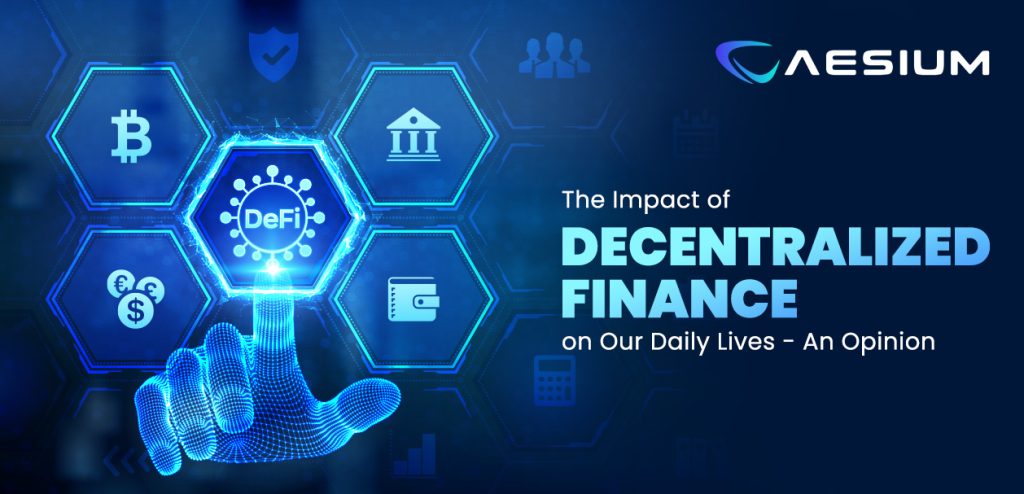The Impact of Decentralized Finance on Our Daily Lives – An Opinion

Synopsis: From innovative approaches to finance, like layer 2 solutions and cross-chain interoperability, to tangible real-world applications in climate monitoring, insurance automation, and even real estate investment, DeFi is driving change and decentralizing innovation. This blog explores how DeFi is shaping our daily lives, offering a glimpse into a decentralized financial future filled with possibilities.
Centralization is rooted at the heart of yesteryear living. In a way, it made us slaves to a common power. But technology, and decentralized finance, in particular, have broken that yoke and allowed for greater financial free will. Just like how the government in America has embraced decentralization (via state-to-state sovereignty), decentralized finance or DeFi has wrestled power from the grasp of an entity and returned it to us. The days of dictatorship under financial authorities reserving the sole power to determine financial markets are over. In its stead, a new era of decentralized financial freedom is blooming.
Transforming Daily Life: Understanding the Impact of Decentralized Finance
When we talk about the decentralized finance impact, many people have their reservations. That’s understandable given how Defi has been blown out of proportion one too many times. But oftentimes, it has lived up to expectations.
Cryptocurrencies, for example, are putting up the structure for a new way of transacting. Many people today are buying items online and various goods through the exchange of digital tokens. With these digital currencies, if you will, this is setting the stage for a fully digital world where cash and crypto will be interchangeable terms.
Decentralized finance has also set loose a revolution (DeFi for the people, by the people), and its impacts are very much real (sometimes tangible even) and significant. In cases where traditional banks may not agree to fund certain projects, DeFi provides an alternate route for crowdsourcing to empower even more ambitious business ideas.
Beyond the Digital World: Real-World Applications of DeFi
Decentralized finance is often thought of in constricted vision, with many thinking about it within the boundaries of the digital world e.g. crypto trading. However, the real-world DeFi applications we’re seeing today offer concrete proof that while decentralized finance may be largely digital, they cause very real effects in the physical world.
Here are a few examples to demonstrate that:
- Climate change: DeFi is coming in handy as an option to provide a foolproof way of accurately monitoring the carbon emissions of companies, primarily through smart contracts.
- Insurance: In this industry, decentralized finance solutions are automating settlements through smart contracts. This is reducing the burden on human adjusters while making the process cost- and time-effective as well.
- Real estate: The prohibitive costs of owning a home have traditionally locked out most people from property investment. That’s all changing with decentralized finance, which allows for part-ownership of housing projects. Much in the same way you buy shares in a company, DeFi allows us to securely own fractions of a property.
Another major use case of DeFi is in banking, where the technology enables loan borrowing without borrowers needing to have a bank account.
Unlocking Real Estate Opportunities: Cryptocurrency Investment in Property
The global real estate market size is set to surpass $729.4 trillion at a CAGR of just over 3.5%. A significant contributor to this growth has been real estate investment with cryptocurrency.
Via cryptocurrencies, investors can buy tokenized real estate. The best part about this new way of property investment is that you can collaborate with fellow investors, without necessarily having a personal connection to them and from anywhere in the world, to own portions of real estate. This means you can reap the profits of property investment without having to go all in to match the asking price.
Additionally, real estate investment with cryptocurrency also makes it possible to tap into real estate opportunities even way beyond your borders. You can be part of real estate investment projects anywhere in the world without having to worry about the safety of your investment thanks to the security of smart contracts.
Besides fractional ownership, other ways DeFi is revolutionizing the real estate industry include:
- Use of digital title deeds (NFT) to hasten ownership transference.
- Creating property listings via NFTs to improve accessibility and the property sales process.
- NFTs may also be put to work for proper property valuation.
Addressing Global Challenges: DeFi’s Role in Climate Change Solutions
Scientists suggest that our planet is undergoing a sixth mass extinction as human life has soared while resources have plummeted. Climate change, meanwhile, has further compounded the problem, increasing global temperatures and the number of extreme events.
Amid the climate change solutions that the experts are serving up, decentralized finance has come up as a very plausible one. Here are some ways DeFi is making a change in this regard:
- Carbon market interoperability: Decentralized finance is making it possible to trade carbon offsets across different markets.
- Accountability safeguards: Decentralized finance offers a means to track carbon emissions, free of data manipulation which has plagued traditional accountability solutions.
- Regenerative agriculture: To ensure more environmentally friendly agriculture, DeFi can be a tool to incentivize a culture of regenerative agriculture.
- Smart contract crop insurance: Decentralized finance has also made it possible for farmers to safeguard their crops by taking out affordable insurance based on smart contracts.
Innovative Approaches to Finance: Exploring DeFi’s Ongoing Innovations
DeFi is not just about decentralizing finance, it’s also about decentralizing innovation. Speaking of which, layer 2 solutions are currently being experimented with as a way to provide highly scalable decentralized finance. With demand for DeFi rising, layer 2 solutions are a top DeFi innovation.
Most DeFi technologies today run on layer 1 networks. Layer 2 solutions will expand the capabilities and reach of already existing blockchain networks, primarily to facilitate accelerated transaction throughput. Besides bumping up the speed of transactions, layer 2 solutions will also ensure even more cost-effective transactions.
Another key DeFi innovation is the implementation of cross-chain interoperability. Here, we’ll have solutions that bridge different blockchains, to ensure even more seamless connections across different DeFi ecosystems. Finally, there has also been a surge in the number of DeFi derivatives and options. This can only mean that DeFi markets will keep on adding depth and increasing trading opportunities.
As interest and users continue to grow while technology evolves, we can expect DeFi to continue pushing the envelope of innovation,






